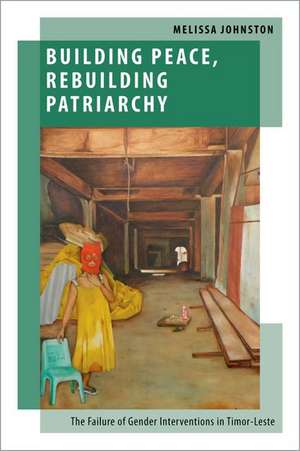Building Peace, Rebuilding Patriarchy: The Failure of Gender Interventions in Timor-Leste: OXF STUDIES GENDER INTL RELATIONS SERIES
Autor Melissa Johnstonen Limba Engleză Hardback – 20 sep 2023
Preț: 341.12 lei
Preț vechi: 468.63 lei
-27% Nou
Puncte Express: 512
Preț estimativ în valută:
65.27€ • 68.16$ • 53.90£
65.27€ • 68.16$ • 53.90£
Carte disponibilă
Livrare economică 14-20 martie
Preluare comenzi: 021 569.72.76
Specificații
ISBN-13: 9780197637999
ISBN-10: 019763799X
Pagini: 280
Dimensiuni: 237 x 163 x 23 mm
Greutate: 0.53 kg
Editura: Oxford University Press
Colecția OUP USA
Seria OXF STUDIES GENDER INTL RELATIONS SERIES
Locul publicării:New York, United States
ISBN-10: 019763799X
Pagini: 280
Dimensiuni: 237 x 163 x 23 mm
Greutate: 0.53 kg
Editura: Oxford University Press
Colecția OUP USA
Seria OXF STUDIES GENDER INTL RELATIONS SERIES
Locul publicării:New York, United States
Recenzii
Melissa Johnston has penned what will surely be an instant classic in the fields of peacebuilding and post-conflict reconstruction. Through careful fieldwork, Johnston shows that international peacebuilders in Timor-Leste, in some cases knowingly and in other cases ignorantly, carefully rebuilt and strengthened the systems of patriarchy. As a result, not only women, but the nation of Timor-Leste itself, are in a worse situation because of the international community's peacebuilding intervention. The 'local turn' in peacebuilding is revealed by Johnston as a deal with the devil of women's subordination, with all the negative consequences thereof for the whole society. It's time to ask who really gets what from international peacebuilding efforts. Highly recommended.
Melissa Johnston's tour de force study of post-conflict Timor-Leste explains why peacebuilding interventions frequently fail to achieve their intended outcomes-especially their aspirations for gender justice. While liberal rights-based reforms are well intended and the local peacebuilding turn provides hybrid alternatives, structural feminist political economy analysis illuminates how unjust gendered divisions of labor and power are perpetuated by both cultural traditions and neoliberal mechanisms of aid and finance. Fundamentally, Johnston exposes the material relations that reinforce patriarchal power in a post-conflict society and the gendered violence that cements it. Her analysis is of major relevance to myriad post-conflict interventions, from Afghanistan and Iraq to Ukraine and Myanmar, and should therefore be read widely!
Drawing from extensive fieldwork, Johnston sheds light on the dynamics of post-conflict reforms in Timor-Leste. This rich, humane, and compelling account describes how the post-conflict period has been dominated by a coalition of militarized and patriarchal elites, to whom peacebuilders have made numerous concessions at women's expense. Furthermore, she deftly weaves together the connections between gender relations, class, and kinship in the country. This book is a compelling contribution to a growing literature.
Building Peace, Rebuilding Patriarchy, Johnston both provides a helpful analytical framework andinvites new critical questions on the political economy of gender-based injustices in peace-building environments.
Melissa Johnston's tour de force study of post-conflict Timor-Leste explains why peacebuilding interventions frequently fail to achieve their intended outcomes-especially their aspirations for gender justice. While liberal rights-based reforms are well intended and the local peacebuilding turn provides hybrid alternatives, structural feminist political economy analysis illuminates how unjust gendered divisions of labor and power are perpetuated by both cultural traditions and neoliberal mechanisms of aid and finance. Fundamentally, Johnston exposes the material relations that reinforce patriarchal power in a post-conflict society and the gendered violence that cements it. Her analysis is of major relevance to myriad post-conflict interventions, from Afghanistan and Iraq to Ukraine and Myanmar, and should therefore be read widely!
Drawing from extensive fieldwork, Johnston sheds light on the dynamics of post-conflict reforms in Timor-Leste. This rich, humane, and compelling account describes how the post-conflict period has been dominated by a coalition of militarized and patriarchal elites, to whom peacebuilders have made numerous concessions at women's expense. Furthermore, she deftly weaves together the connections between gender relations, class, and kinship in the country. This book is a compelling contribution to a growing literature.
Building Peace, Rebuilding Patriarchy, Johnston both provides a helpful analytical framework andinvites new critical questions on the political economy of gender-based injustices in peace-building environments.
Notă biografică
Melissa Johnston is a Lecturer in the School of Political Science and International Studies at the University of Queensland. Her work applies a gender lens to examine the links between security and the political economy of development to better understand women's and men's experiences in conflict-affected environments. Her work on conflict, international financial institutions, and violent extremism in Southeast Asia has been published in journals such as Review of International Political Economy, Globalizations, and Studies in Conflict and Terrorism. Her article, "Frontier Finance", won the 2021 Australian International Political Economy Network Prize. She is the recipient of the 2019 Australian Political Studies Association PhD Thesis Prize and the Prime Minister's Endeavour Award.


